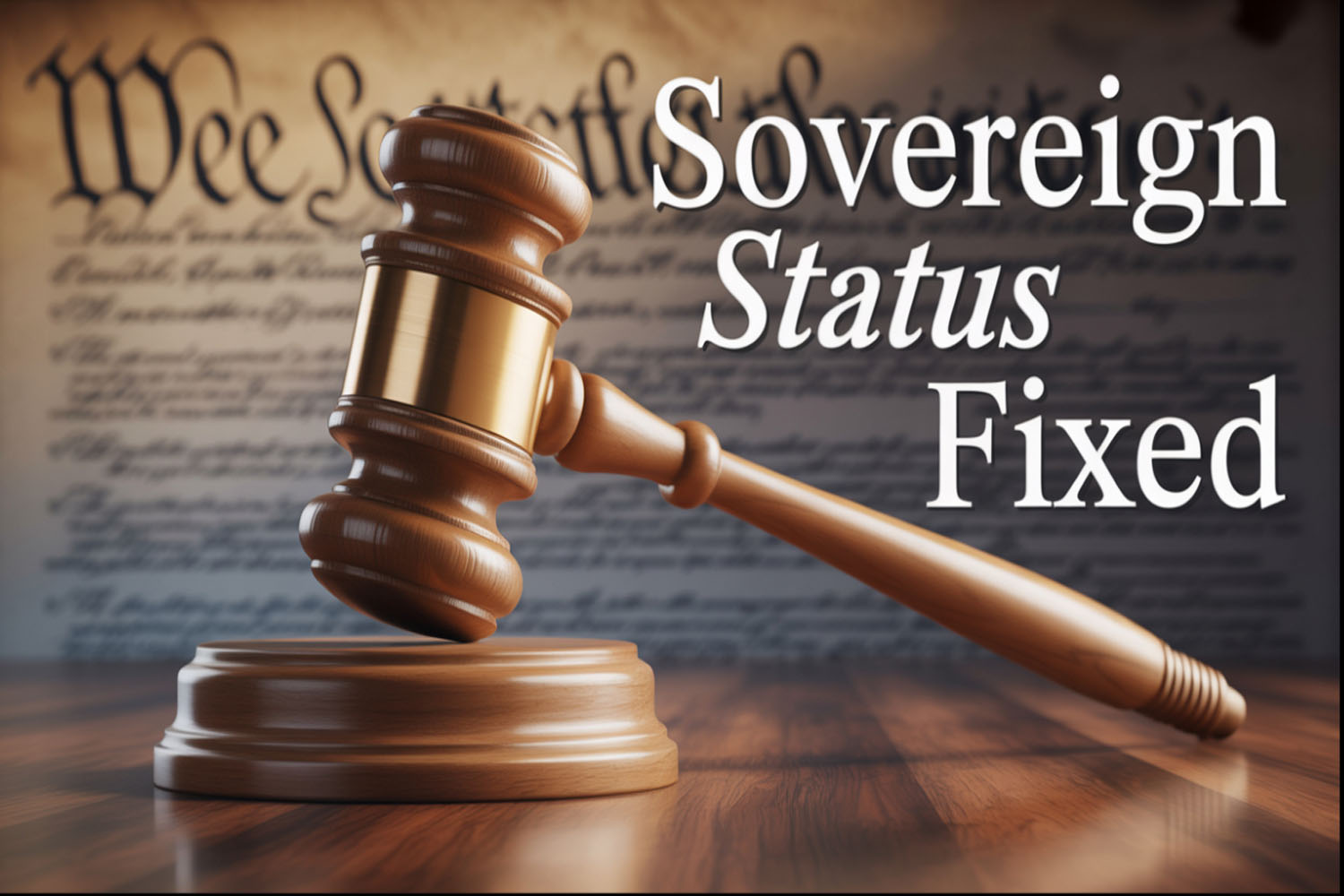“It is better to trust in the Lord than to put confidence in man. It is better to trust in the Lord than to put confidence in princes [the government].”
— Psalm 118:8–9
“Put not your trust in princes [the government], nor in the son of man, in whom there is no help.”
— Psalm 146:3
I. The Importance of Accurate Citizenship Representation
One of the most subtle yet pervasive ways the federal government asserts jurisdiction over individuals is through presumption—particularly regarding one’s citizenship status on official documents. Misrepresenting one’s status as a statutory “citizen of the United States”—as defined by federal law and not the Constitution—can inadvertently subject individuals to authorities and obligations that do not lawfully apply to them.
Under 28 U.S.C. §1603(b)(3), a person who is a statutory “citizen of the United States”—where “United States” refers to the federal zone—cannot simultaneously claim the status of a foreign sovereign. Thus, the first step in reclaiming individual sovereignty involves correcting all documentary evidence to reflect accurate citizenship status. This includes, but is not limited to, the following records:
- Federal and state income tax filings
- Voter registration forms
- Driver’s licenses
- Military service and security clearance applications
- Social Security records
- Passport applications
- Birth certificates
- Employment documentation
- Bank and financial records
Each of these records can be subpoenaed and used to assert a presumption of federal jurisdiction, especially in legal proceedings. Ensuring consistency and accuracy in these records is critical to limiting unwarranted federal claims.
II. Legal Definitions and Presumptions
Under 8 U.S.C. §1101, we find several key definitions:
- (a)(21): “National” means a person owing permanent allegiance to a state.
- (a)(22): “National of the United States” means either a U.S. citizen or a person who, while not a citizen, owes permanent allegiance to the United States.
- (a)(38): The “United States,” unless otherwise stated, refers to the federal territories (e.g., D.C., Puerto Rico, Guam, etc.).
In the Internal Revenue Code (IRC), the only formal definition of “citizen of the United States” is found in 26 C.F.R. §31.3121(e)(b), which states:
“The term ‘citizen of the United States’ includes a citizen of the Commonwealth of Puerto Rico or the Virgin Islands, and, effective January 1, 1961, a citizen of Guam or American Samoa.”
This definition reinforces the interpretation that “U.S. citizen” in a statutory context refers to individuals domiciled in federal territories, not those domiciled in sovereign states of the Union.
III. The Role of Presumption in Legal Proceedings
According to 3C AmJur 2d 204, §2677:
“As a general rule, it is presumed, until the contrary is shown, that every person is a citizen of the country in which he or she resides.”
This presumption also applies to U.S. citizenship. Once asserted or recorded—particularly on government forms—it remains until disproven. The burden of proof lies on the individual claiming otherwise.
This principle was affirmed in U.S. v. Slater, 545 F. Supp. 179, 182 (1982):
“Unless the defendant can prove he is not a citizen of the United States, the IRS has the right to inquire and determine a tax liability.”
IV. Constitutional vs. Statutory Citizenship
There is an important distinction between constitutional citizenship and statutory citizenship. In Rogers v. Bellei, 401 U.S. 815 (1971), the U.S. Supreme Court recognized that individuals may be U.S. citizens under the Constitution but not under congressional statute, or vice versa.
Those born in and domiciled within one of the 50 states are considered state nationals or nationals under 8 U.S.C. §1101(a)(21). This is not synonymous with being a statutory U.S. citizen under 8 U.S.C. §1401, which often includes persons born in federal territories or those naturalized under the laws of Congress.
V. Jurisdiction and Taxation
The government’s authority to tax is based largely on domicile and the engagement in federal privileges, not mere physical presence within a state. According to the U.S. Constitution Annotated:
“The Federal Government may tax property belonging to its citizens, even if such property is never situated within the jurisdiction of the United States, and it may tax the income of a citizen or resident abroad.”
This highlights that tax liability under the IRC stems from domicile within the federal zone or engaging in taxable activities such as a “trade or business,” as defined in 26 U.S.C. §7701(a)(26).
Furthermore, Cook v. Tait, 265 U.S. 47 (1924), confirmed that the U.S. may tax its statutory citizens even if they reside abroad, reaffirming that jurisdiction is personal rather than territorial.
VI. Correcting Your Status
While the term “expatriation” suggests renouncing one’s allegiance to a nation, what is often more accurate is amending or correcting the record to reflect one’s actual constitutional status—i.e., as a national or state national rather than a statutory “U.S. citizen.”
Per Black’s Law Dictionary (6th Ed.), “expatriation” is defined as:
“The voluntary act of abandoning or renouncing one’s country, and becoming the citizen or subject of another.”
In this context, the goal is not to abandon U.S. nationality but to ensure that one’s federal citizenship designation aligns with actual constitutional and lawful domicile. The options for proper status are:
- “National” – 8 U.S.C. §1101(a)(21)
- “State National” – One who owes allegiance to a state of the Union but not to the federal zone
1. Correct/Amend Government Forms & Documents
- Objective: Remove or amend any instance where you identified yourself as a “U.S. citizen” (statutory).
- Examples:
- Voter registration
- Passport applications
- Tax returns
- Driver’s licenses
- Social Security records
- Bank and employment forms
- Method: Submit corrected affidavits or statements declaring yourself a “state national” or “non-resident non-person”, not a statutory U.S. citizen.
2. File a Declaration of Status
- Content: A notarized affidavit that declares:
- You are a “state national”
- You are not a “U.S. citizen” under 8 U.S.C. §1401 or 26 C.F.R. §31.3121(e)
- You are not domiciled in federal jurisdiction (e.g., D.C., Puerto Rico, etc.)
- Where to file: This is not filed with the government. It is typically mailed to agencies or retained in personal records to assert “lawful status” in case of future disputes.
3. Avoid Federal Benefits or Agencies
- Rationale: Claiming federal privileges (Social Security, Medicare, etc.) is considered a tacit admission of federal jurisdiction.
- Action: Stop using or receiving federal benefits, close any ties with federal programs.
4. Create or File Public Notice
- Some proponents suggest:
- Recording your declaration in a county recorder’s office or other public record.
- Publishing a “Notice of Status” in newspapers to serve as constructive notice.
5. Revoke Voter Registration
- Why: Voting in federal elections is seen as consenting to federal jurisdiction.
- How: Submit a voter registration cancellation form and retain proof.
6. Cancel Passport / Reapply with Corrected Status
- This step is controversial and often not pursued unless expatriation is intended.
7. Renounce Taxpayer Identification
- Action: Declare yourself not a “taxpayer” as defined in the Internal Revenue Code (per their belief).
- Document: May involve a letter to the IRS stating that you are not a “U.S. person” or “individual” under 26 U.S.C. §7701.
8. Expatriation (Optional and Extreme Step)
- Formal expatriation via 8 U.S.C. §1481 involves:
- Appearing before a U.S. consular or diplomatic officer abroad
- Signing an oath of renunciation
- Losing U.S. nationality entirely
- Consequences: You will lose your passport, be barred from many rights, and may still be subject to expatriation tax under 26 U.S.C. §877 if you had significant assets.
🔹 Legal Reality & Risks
- Courts do not recognize “state national” vs. “statutory U.S. citizen” distinctions in the way described.
- Claiming to be a “non-resident non-person” or “non-taxpayer” does not exempt you from tax obligations if you meet the criteria under the Internal Revenue Code.
- The IRS and courts routinely sanction people who use these theories, e.g.:
- United States v. Sloan, 939 F.2d 499 (7th Cir. 1991)
- Cheek v. United States, 498 U.S. 192 (1991)
- United States v. Bell, 414 F.3d 474 (3d Cir. 2005)
🔹 Key Takeaways
- This document promotes a legally invalid interpretation of citizenship and tax law.
- There is no recognized legal process to “convert” from being a statutory U.S. citizen while retaining U.S. nationality and avoiding tax obligations.
- If you attempt to act on these procedures, you may:
- Lose key legal protections.
- Face enforcement actions from the IRS or DOJ.
- Be subject to civil and criminal penalties for tax evasion or false filings.
Rescission of IRS Form Signatures and Federal Tax Election
1. Rescission of IRS Form 1040 and Associated Filings
I, [Full Legal Name], a national of the state of [State], physically present in but not domiciled within [County], [State], one of the sovereign States of the American Union, hereby formally and irrevocably rescind, revoke, annul, and render void ab initio all prior signatures and submissions to the Internal Revenue Service (IRS), including but not limited to IRS Forms 1040, W-4, and all State income tax forms. This rescission includes any real or implied powers of attorney associated with these forms.
This action is taken on the grounds that any previous signatures were obtained through mistake, duress, undue influence, and/or fraud, resulting in the absence of informed and voluntary consent. I assert my right under contract law to rescind any agreements not entered into knowingly and voluntarily. As such, all purported consents are declared null and void.
Definition (Black’s Law Dictionary, 6th Ed.): “Rescission” refers to the cancellation of a contract, restoring the parties to their original positions as if the agreement had never been made.
I further revoke any powers of attorney granted—express or implied—to any agency or department created under Article I, Section 8, Clause 17, and/or Article IV, Section 3, Clause 2 of the U.S. Constitution.
2. Revocation of Real Property Income Election (IRC §871)
2.1 Background
An individual who files IRS Form 1040 is presumed to elect to treat income from U.S.-sourced real property as effectively connected with a U.S. trade or business. This election remains in force unless formally revoked pursuant to 26 C.F.R. § 1.871-10.
2.2 Procedure to Revoke
Per 26 C.F.R. § 1.871-10(d):
- A written request to revoke must be submitted to the Director of International Operations, IRS, Washington, DC 20225.
- The request must:
- Identify the taxpayer,
- Be signed by the taxpayer or authorized representative,
- State the tax year affected,
- Be filed within 75 days after the close of the tax year,
- Justify the request with supporting grounds.
If the election is revoked without IRS Commissioner consent, the taxpayer must amend prior returns or file for credit/refund where applicable.
3. Modification of Voter Registration
Many state voter registration forms require affirmation of “U.S. Citizen” status without defining the term. To clarify intent:
- Add the following statement to the registration form in any available section:
“I, [Full Name], declare under penalty of perjury under the laws of [State] that I do not reside on federal property, and I am not a statutory ‘U.S. citizen’ under 8 U.S.C. § 1401. I claim non-resident, non-person status as described in 8 U.S.C. § 1101(a)(21), retaining all unalienable rights under the Constitution. I waive no rights and do not consent to any implied contract with the government. UCC 1-308.”
- Attach a supplementary affidavit entitled Affidavit of Clarification and Citizenship for Voter Registration.
- Annotate the voter registration form with: “Not valid without attached Affidavit of Clarification.”
- Request a notarized copy of the complete voter registration (including the attachment) from the county recorder for legal record.
4. Update Government Security Clearance
Add the Affidavit of Clarification of Citizenship for Security Clearance (Section 10.6.7) to any current or future government security clearance documentation to reflect citizenship clarification.
5. Notify Secretary of State and Attorney General
Send a certified letter titled:
Legal Notice of Change in Domicile/Citizenship Records and Divorce from the United States
to:
- The U.S. Secretary of State
- The U.S. Attorney General
Include a proof of service.
6. Public Declaration
6.1 Publish the Following in a Local Newspaper:
DECLARATION OF INDEPENDENCE
“I, [Full Legal Name], hereby declare my intention to relinquish statutory ‘citizen of the United States’ status under 8 U.S.C. § 1401 and return to my natural status as a ‘non-citizen national’ pursuant to 8 U.S.C. § 1101(a)(22)(B). I revoke any political affiliations implied by statutory citizenship and reclaim my sovereignty as a member of the constitutional Republic.”
6.2 Obtain and Retain an Affidavit of Publication from the newspaper.
7. Rescind Social Security Participation
Submit Form #06.002 – Resignation of Compelled Social Security Trustee to revoke any implied trustee obligations.
Legal Justification:
- Per 26 C.F.R. § 301.6109-1(g), holding a Social Security Number (SSN) creates a rebuttable presumption of being a “U.S. citizen” or “resident alien.”
- This presumption may be rebutted by submitting proof of foreign status and formally changing the status of the SSN in IRS records.
8. Update U.S. Passport Records
Complete the Passport Process to reflect your revised citizenship and domicile status in passport applications.
Additional Considerations
IRS Interactions
If asked by the IRS, “What country are you a citizen of?”—you may respond:
“I am a constitutional citizen by birth, but I am not a statutory ‘U.S. citizen’ under any Act of Congress. I am a non-resident non-person domiciled in a legislatively but not constitutionally foreign state.”
Avoid engagement in emotionally manipulative discussions. If challenged, cite the legal right to expatriate under:
15 Stat. 223-224 (1868), R.S. § 1999, 8 U.S.C. § 800 (1940)
“The right of expatriation is a natural and inherent right of all people… and any action that denies or impairs that right is inconsistent with the fundamental principles of this government.”
Support your position with lawful evidence and avoid reacting to intimidation or verbal abuse.
VII. Final Remarks
The federal government’s authority over individuals often hinges on subtle legal classifications and unchallenged presumptions. A clear understanding of these classifications—and vigilance in how they are declared on legal and administrative forms—is essential to preserving one’s constitutional rights and sovereignty.
Individuals should carefully review and correct all documentation that presumes federal citizenship where none exists. Only through clarity and consistency can one effectively assert constitutional status and limit unwarranted federal jurisdiction.







